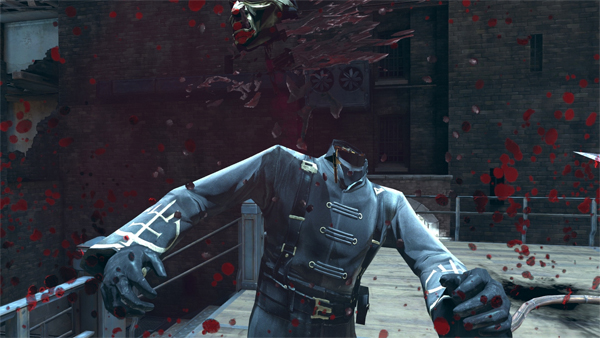Let’s face it: the world is nuts, and near-miss asteroids, urban cannibals, bath salts, and Westboro Baptist Church are only the tip of the iceberg of crazy. In the midst of such chaos, nothing is more comforting than a sense of free will and agency. If only reality came with a reset switch and a decent controller. In the meantime, gamers can seek secondary solace in the virtual realm by taking charge of their own destiny. Or even Destiny, with a capital D.
For all that the video game industry tends to strive for realism, one fundamental (and necessary) difference between life and gaming is the question of influence and efficacy. I’ve written before about how very unfair real life can be in terms of failure and its consequences, but there’s more to it than that. We live in an open-source sandbox world run by all-powerful forces of nature (or, if you happen to be religious, the deity or pantheon of your choice) wherein the only true control we have is over ourselves, and even that is arguable. No wonder everyone seems to be losing their marbles.

Video games, in contrast, are all about control. When we first learn to play a game, we familiarize ourselves with the controls we use to manipulate our in-game characters. What comes with our consoles? Controllers. In even the most linear of titles with only one boring ending and zero customization, gamers are still granted a myriad of choices, from little things like which weapon to use when or which strategy is best when facing a given enemy, to the bigger decisions of when to pause, switch off, or abandon the game entirely.
The game that got me wondering about gaming and fate was, of course, Destiny, a highly complex super-release of epic proportions that would allow players to “Become Legend,” or so the adverts told us. Described as a shared-world first-person shooter with a sci-fi theme, many elements of Destiny’s gameplay and world-building are meant to occur naturally, thanks to randomized player matching and an evolving environment. However, there’s a little less destiny-shaping going on than the title suggests. Most of the gameplay elements which allow for player agency are fairly standard – choice of subclass specialization, character customization, etc. – nothing as ground-breaking as one might have expected or hoped for. Even the endgame reward seems to suggest the player’s choices lack impact; all players receive the exact same weapon, regardless of whether it is even remotely suitable for their chosen skill set.
A better choice of high-quality sci-fi/fantasy adventure, if choice is what you’re after, might be Dishonored. Though flawed at times and prone to the occasional AI fail, the deceptively linear structure of the story actually permits a surprising range of options regarding the means to each objective’s end. Sure, you could assassinate that guy with your badass crossbow of certain death – or perhaps you might want to play it safe and knock him out instead, just in case he might prove useful later. (Hint: he probably will.) There is some restriction here, as killing or even just mildly maiming some characters can lead to an immediate game-over, but for every one of these there are at least two non-essential characters just waiting to be murdered. Or not. Your call.

For pure, unadulterated agency, there’s always Telltale Games and their particular (and particularly awesome) brand of choose-your-own-adventure storytelling. Choice is a core element of gameplay in both The Wolf Among Us and The Walking Dead series, and often, it really is the little things that matter. Handing a candy bar over to a frightened, hungry child instead of eating it yourself could turn a stranger into a vital friend. Losing your temper and punching that one obnoxious guy in the face, on the other hand, just might come back to bite you in rear, because, as the game itself will warn you, he’s “DEFINITELY going to remember that.”
Thatgamecompany took agency in a very different direction with Flow, Flower, and Journey by encouraging wide interpretation of goals and purpose within a narrow set of events. In each, actions are limited to directional movement and (in the case of Journey) an abstract, joyful-sounding whistle, which could mean anything from “Hi there!” to “Thanks!” to “Holy c*** did you see that giant monster thing? It totally tried to eat me!” Progress is fairly linear in all three games, but not once is the player directly asked to perform a specific chore or reach a certain goal. The lack of instruction gives weight and meaning to choice, turning each decision into a discovery born of experimentation rather than just another task to check off of a to-do list.
Then there’s the Sims franchise. An odd duck, perhaps, to be found in this list, but it belongs here for the sheer amount of stuff to do and stories that can be told with each game in the series. Putting aside (somewhat reluctantly) the various grisly deaths Sims can be manipulated into, the variety of existence that exists within the Sims universe is pretty breathtaking. Players can live vicariously through one specific avatar Sim they’ve created, play puppet master and pull the strings of several characters at once, or just sit back and watch the chaos unfold as careers take off, lovers meet (or cheat), and houses burn to the ground thanks to Bob’s terrible cooking skills.

Unfortunately, it looks like the Sims 4 may have dropped the ball somewhat bit in this regard, due perhaps to overcomplicating character personalities at the expense of freedom of movement and room to breathe (those Sims are just so darn demanding!). Nevertheless, the amount of control the Sims games give players over world and characters alike is incomparable. Even the best of sandboxes like Minecraft and well-told and complex roleplaying games like The Witcher series don’t quite hit the same level of pure player omnipotence. It’s a heady feeling, being ruler of the universe.
It may all be just a digital illusion, but after a long day at work, or watching over hyperactive kids, or even just home alone wondering what the heck you’re going to do with your life, knowing that there’s somewhere you can go where you can be exactly who you mean to be and live exactly as you choose can be a gift beyond measure. Players may not control every aspect of a game, and free will isn’t always as free as we’d like – every map has its boundaries, and even the most detailed RPGs can offer only so many options – but navigation within these limits is entirely up to us, and can often even be bypassed by modding, cheating, hacking, or exploiting game mechanics. Most of these techniques tend to be frowned upon, it’s true, but they do serve to prove a point: all rules can be broken. Restrictions can be overridden. Limitation is the real illusion. Regardless of the world you’re living in, the course of your destiny, whether it comes with a capital D or not, is ultimately up to just one person – you.

 …WOOLY DESERVES BETTER LOL!
…WOOLY DESERVES BETTER LOL!